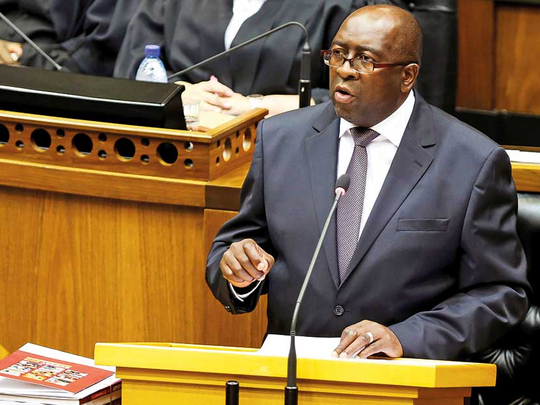
South Africa’s President Cyril Ramaphosa reshuffled his cabinet on Monday after coming to power two weeks ago when scandal-plagued Jacob Zuma resigned under pressure from the ruling African National Congress.
Below are details of some key ministers:
Nhlanhla Nene — Finance Minister: Nhlanhla Nene served as finance minister from May 2014 until December 2015, when Zuma fired him and replaced him with unknown parliamentary backbencher Des van Rooyen.
A collapse in the rand currency forced Zuma to sack van Rooyen and reappoint a previous finance minister, Pravin Gordhan, just four days later.
Nene, a veteran civil servant who was keen to rein in government spending, had been reluctant to rubber-stamp an ambitious plan to build a number of nuclear power stations, a project that might cost as much as $100 billion and one which Ramaphosa has frankly said South Africa cannot afford.
Nene has since taken up roles in the private sector, including as a board member at fund manager Allan Gray, resident adviser at investment firm Thebe Investment Corporation and as acting head of a business school in Johannesburg.
David Mabuza — Deputy President: ANC Deputy President David Mabuza is the new Deputy President of South Africa and premier of Mpumalanga province. He has not served as a cabinet minister before.
Mabuza was an ally of Zuma and was accused of involvement in corruption in awarding tenders. He has denied any wrongdoing.
Mabuza’s influence in Mpumalanga will be significant for Ramaphosa and the ANC in next year’s parliamentary election.
Pravin Gordhan — Public Enterprises Minister: A popular figure with investors, Gordhan served as Minister of Finance from 2009 until 2014 and again from 2015 until 2017.
Gordhan has been a critic of the corruption that dogged Zuma’s term and there will be high expectations for him to clean up state-owned firms. His combative style can be divisive.
Nkosazana Dlamini-Zuma — Minister in the Presidency: The former minister and chairwoman of the African Union Commission narrowly lost to Ramaphosa in an ANC leadership election in December and she would have hoped to be naming her own cabinet at this stage.
Dlamini-Zuma was married to former president Zuma for over a decade and has four children with him.
Lindiwe Sisulu — Foreign Affairs Minister: Sisulu initially ran against Ramaphosa in the ANC leadership race last year but later withdrew, choosing to pursue the deputy position, which she lost to David Mabuza.
Most recently serving as human settlements minister, Sisulu is the daughter of anti-apartheid activist Walter Sisulu, a close friend of Nelson Mandela.
While in exile during apartheid, Sisulu joined the military wing of the ANC, working in intelligence.
Gwede Mantashe — Minerals Resources Minister: Trade unionist Mantashe, 62, is currently the national chairperson of the ANC and former secretary-general of the party — a position he held for 10 years.
The shrewd party strategist was the first trade unionist appointed to the board of directors of a company listed on Johannesburg’s stock exchange.
Jeff Radebe — Energy Minister: Radebe is one of the longest-serving ministers in post apartheid South Africa, having held several senior cabinet positions, including as minister of public enterprises, justice and transport.
He served in underground structures of the ANC during white minority rule and was imprisoned on Robben Island, where the apartheid government kept political prisoners.
Malusi Gigaba — Home Affairs Minister: Gigaba returns to the home affairs ministry after having served as finance minister since being appointed by Zuma in March. He delivered the budget last week.
Gigaba has previously served as Minister of Public Enterprises.
A South African court found last year that Gigaba had violated the constitution by lying about a dispute with a company during his time at home affairs. Gigaba has said he will challenge the ruling.
Zweli Mkhize — Cooperative Governance and Traditional Affairs Minister: The ANC’s former treasurer general was an outsider in the party’s leadership race won by Ramaphosa in December.
A medical doctor by training, Mkhize also served as a party boss in the Kwa-Zulu Natal province, from where Zuma and Dlamini-Zuma hail. Ramaphosa will be relying on Mkhize to reconcile opposing factions in the ANC, analysts say.
Naledi Pandor — Higher Education and Training Minister: A former teacher and veteran minister, Pandor comes from a long line of political activists in Kwa-Zulu Natal, a key province for the ANC and one where Ramaphosa needs allies.
Largely praised for her personal integrity, Pandor has criticised ANC politicians for their lavish lifestyles.
Derek Hanekom — Tourism Minister: A white Afrikaner, Hanekom has served as a minister under every president since the end of white-minority rule, including as minister of land under Nelson Mandela.
Hanekom was one of the most vocal critics of Zuma and was sacked as tourism minister last year after publicly calling for his removal.












